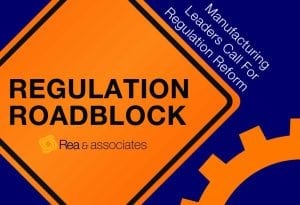
Albion Industries in Strongsville, Ohio,
said American companies simply can’t
compete with their foreign counterparts.
“There is little to no overhead in the
overseas markets,” he said, “and in this
market, it’s all about who can offer the
best price.” Click here to view the full slideshow.
Have you ever wondered what goes into the cost of manufacturing a product in America?
Material and labor costs factor into the price of a product. And so do transportation and marketing costs. But did you know that American manufacturers must also manage costs associated with compliance to increased regulations and government mandates? Unlike their overseas counterparts, American manufacturing companies are subjected to a variety of regulation roadblocks and, in the interest of making money, have to charge a little bit more for products that are “Made in the USA.”
Manufacturing Day 2015 is Friday!
Our economy is directly influenced by the success of the manufacturing industry, yet obstacles continue to clutter the road toward efficiency and growth. While many observers expect to see a boom in job creation and revenue generation, some Ohio-based manufacturers predict that increased regulation, fewer qualified employees and continued confusion around the Affordable Care Act (ACA) may hinder their growth rate.
“There’s a wave of manufacturing coming,” said Randy Bennett, president and CEO of Automation Tool & Die, Inc. (ATD) in Brunswick, Ohio. “But we won’t be ready for it if we have to focus on what’s going on in the courts instead of what’s going on in our companies.”
Take A Detour: Top 4 Detours For Financial Relief – Created with Haiku Deck, presentation software that inspires
Wanted: A Common Sense Solution
“When legislators implement laws, they don’t always understand how they will impact individual businesses or industries,” said Lee Beall, CPA, Rea’s CEO. “Yet, if Ohio wants to keep and attract businesses to the state, it needs to uncover these laws and fix them.”
Citing his own experience, Bennett pointed to the Ohio Bureau of Workers’ Compensation as an agency in need of regulation reform. According to Bennett, ATD was required to hire its own legal counsel and investigators, and commit internal resources to combat fraudulent claims. While successful to date, Bennett said that the BWC has done nothing to ensure that ATD will be reimbursed for the costs it incurred throughout the investigation – on the contrary, ATD is now required to pay higher workers’ compensation premiums, a decision the company continues to contest.
“We are fighting the good fight,” said Bennett. “All we want are reforms that are reasonable and fair. If Ohio is going to allow businesses to grow and attract other businesses to the state, we must be a business-friendly state. The current workers’ compensation system can directly inhibit that goal through its cumbersome processes and punitive premiums.”
An Unfair Advantage?
Ralph Holstein, president and CEO of Albion Industries in Strongsville, Ohio, said American companies simply can’t compete with their foreign counterparts.
“There is little to no overhead in the overseas markets,” he said, “and in this market, it’s all about who can offer the best price.”
“The field is not level,” said Holstein. “Yes, their labor is cheaper, but they also don’t have to deal with the regulation we have in America. Many foreign companies aren’t required to provide health insurance, but we are. We also have to pay extra for workers’ compensation, and it can be expensive to comply with EPA and OSHA regulations. How are we supposed to compete?”
To stay competitive, US companies have to cut costs wherever possible. For example, Albion has incorporated more temporary workers and product automation.
“I don’t foresee any changes that will help us compete with the foreign influx of goods,” said Holstein. “In the meantime, we just have to do our best, compete where we can, and buy American.”
The Consistency of Change
Another hurdle manufacturers must manage is their obligation under the ACA while realizing that the rules implemented as a result of this legislation are still evolving.
“Investing in employee health care has always been important to us, which is why we have made every effort to ensure that we have the latest and greatest information about Obamacare,” said Steve Shuck, CEO of RICO Manufacturing in Medina, Ohio. “But keeping up with the changes is harder than we expected.”
“It’s been a difficult regulation to plan for and navigate through,” said Kent Stelmasczuk, RICO Manufacturing’s CFO. “We’ve come to expect that the answer we get today will be different from the one we get tomorrow.”
Making It Work
Unfortunately, countless dollars and hours are spent navigating established regulations and providing new and updated information to manufacturing leaders and their employees; and companies such as RICO Manufacturing, Albion Industries and ATD are struggling to find the resources they need to accommodate the anticipated growth. Nonetheless, they are not deterred.
“There’s a lot of opportunity here and we are doing what we can to prepare, which includes operating our companies as lean as possible,” said Bennett. “But the government needs to do the same. We need our legislators to help make Ohio a more welcoming place for manufacturers.”
Manufacturers have a lot to worry about when it comes to navigating regulatory traffic. Email Rea & Associates to find out how a financial advisor can help.
By Frank Festi, Jr., CPA, CFP
Check out these articles for more insight and solutions for your company.
The Great Employee Shortage
Inside The Family Business: Boundaries and Best Practices
